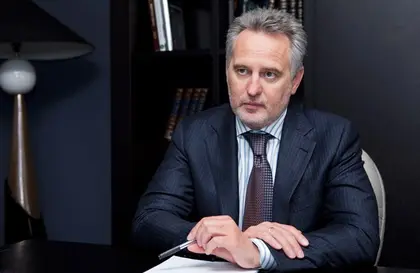The
group’s former owner Valeriy Khoroshkovsky sold 100 percent of Inter Media Group Limited to Firtash, one of Ukraine’s most powerful oligarchs whose
fortune is estimated by Korrespondent magazine to be $3.2 billion.
“Thus, control over Inter, NTN, K1, Mega, Enter-Film, K2, Pixel and MTV goes over to GDF Media Limited, after an agreement is received from the Anti-monopoly committee,” Inter’s statement says.
- Access the newest Ukraine news items published today.
- Ukraine War Casualties
JOIN US ON TELEGRAM
Follow our coverage of the war on the @Kyivpost_official.
The statement said the company was valued at $2.5 billion. But a source familiar with the deal said Firtash acquired his new stake for $1.25 billion.
Yaryna Kluchkovska, Firtash’s spokeswoman, also confirmed the deal, but could not provide any specifics.
Khoroshkovsky
sold his stake in Inter shortly
after disclosing the ownership structure of the channel and parent offshore companies, and after leaving his previous job
as first deputy prime minister on Dec. 14 amidst a scandal.
He accused his former boss Prime Minister Mykola Azarov of inability to conduct reform and move Ukraine closer to Europe.
Khoroshkovsky had said in 2009 that Firtash had an option of buying 50 percent of
Inter channel at the time, but by the end of 2012 Inter’s ownership documents showed no trace of Firtash. Two companies in
a long line of offshore firms were undergoing changes, though.
Firtash’s spokeswoman said the agreement between the former and the new owner took place very recently, but could not provide any details.
Khoroshkovsky
himself owned 61 percent of Inter, another 29
percent was owned by Russia’s Channel 1; the other 10 percent blonged to the
widow of Igor Pluzhnikov, a former co-owner of Inter, who died a
mysterious and sudden death in 2005 at the age of 47.
As
of this autumn, the channel changed
its editorial policy quite radically. Traditionally a very
pro-government channel, it started to give fair amounts of air time to
the opposition, an independent international media study showed.
The channel made another commitment to improve its editorial content
by creating an independent supervisory council of prominent members
of the NGO community whose role was to suggest improvements and oversee their implementation.
The
channel also closed one of its most controversial political talk shows with Russian host Yevgeniy Kiselev and replaced
it with a more balanced Spravedlyvist (Justice) hosted by Anna
Bezulyk. The Friday night show started running on Jan. 25.
All
these changes have not gone unnoticed by the government. Several
sources who spoke on condition of anonymity because of they fear retribution have said
that both Inter and Khoroshkovskiy have been harassed by tax and
other authorities, which resulted in speculations that he might sell
the channel.
In his statement, Khoroshkovsky referrs to some “conditions” that made him sell the channel. “In the conditions that arose I have no possibility to provide for the development of the Group and these circumstances have become my main motivation for sale,” Inter’s press service quoted Khoroshkovsky as saying.
Inter Channel is the nation’s biggest. It has the largest viewership and covers
99.7 percent of Ukraine’s territory, according the channel’s own
information.
Firtash, its new owner, made most of his fortune
by owning a 45 percent stake in RosUkrEnergo, a joint gas trading venture with
Russia’s Gazprom. It was cut out of the business in 2009, but another
one of his gas trading companies, OstChem, imports Russian gas to
Ukraine now.
Firtash also
controls much of Ukraine’s titanium
business and owns a number of chemical and fertilizer plants,
including Concern STIROL, Severodonetsk Production Association Azot
and Cherkassy Azot.
He has not owned any
major media assets so far, but has been in a legal battle with the Kyiv
Post. He sued the newspaper for libel in London for a story that
reported accusations
of corruption and conflicts of interest in the gas trade, but
lost the suit in Feb. 2011.
You can also highlight the text and press Ctrl + Enter




